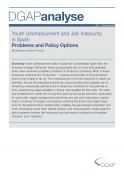It is well known that unemployment rates in Spain, and especially among youth, are considerably higher than the European average. Moreover, young people who do have jobs generally work under very unstable conditions; most have temporary contracts because they are not able to find permanent jobs. The consequences of this job insecurity – a combination of high unemployment rates, temporary employment, and uncertainty about the professional futures of young people – are dramatic. Across the educational spectrum, young workers in Spain have greater chances of remaining unemployed or getting stuck in a temporary contract for long periods of time, experiencing wage penalties, or being over-qualified for their jobs. The crisis has, moreover, increased this group’s risk of experiencing poverty and social exclusion. This is particularly the case for the so-called NEETs (young people who are “not in education, employment, or training”) and those with migrant backgrounds.
Contents
Youth in Germany, France, and Spain: Three Very Different Experiences
Trends in Unemployment Rates
Temporary Employment and the Structure of the Labor Market
Policy Options: Bridge the Gap between Education and Work; Develop Active Labor Market Policies; Reduce Labor Market Segmentation
Click on the box on the right to read the entire text.

